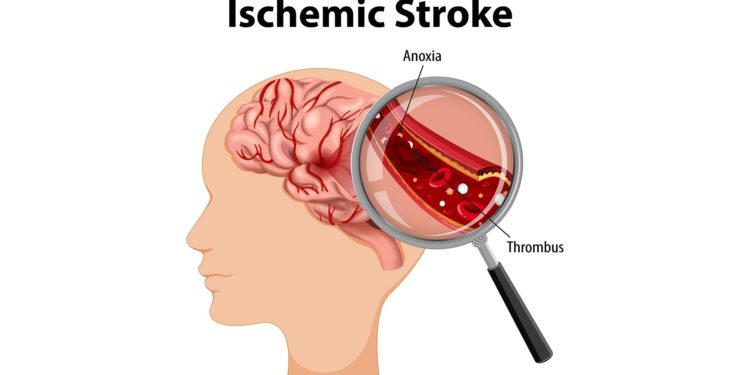Ischemic stroke is a medical emergency that occurs with an abrupt stoppage of blood flow to the brain. It has horrible and profound effects on health because blood flow to body parts is extremely important. The brain is a very complex and sensitive organ, and many different factors must be balanced carefully for it to function properly.
Indeed, a variety of circumstances can impact brain health, making it vulnerable to several factors. Ischemic strokes are a serious health issue that requires immediate attention because they may have long-term effects. The aftereffects of this type of stroke can include a wide range of difficulties, from cognitive insufficiencies to physical disability.
This is one of the serious health emergencies humans go through and to reduce the damage, rapid medical attention is essential. This often involves the restoration of blood flow. Furthermore, an important thing is to be aware of medical conditions so that you don’t have to suffer the unbearable.
Definition of Ischemic stroke
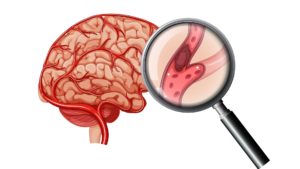
An ischemic stroke is a common and possibly fatal medical illness that occurs when a clot or block in a blood artery in the brain blocks the blood flow. This blockage interferes with normal blood flow, depriving a particular area of the brain of vital nutrients and oxygen. The consequences can be awful, frequently leading to neurological shortfalls like paralysis, trouble speaking, or cognitive issues.
However, it is treatable and one can recover. Knowing the risk factors and identifying early symptoms is important for quick medical attention and efficient treatment, as it plays a major role in reducing the impact of ischemic strokes.
If we understand this condition in simple terms, an ischemic stroke is similar to a clot or blockage causing traffic congestion in the blood arteries of the brain.
Consider it a block that requires immediate care. These blocks or Blood clots in the brain may be more common in those with diabetes, high blood pressure, and heart problems. It is important to recognize warning indicators such as sudden weakness or difficulty speaking, and receiving assistance quickly is like clearing a path.
Medication or surgery is part of the treatment, and regular exercise promotes brain healing. Living a healthy lifestyle and recognizing the warning signals are important to preventing stroke symptoms in a woman and men.
About Stroke
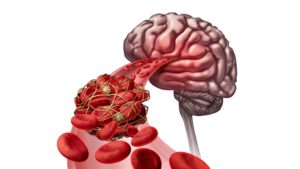
If we talk about stroke in general, there are two possible causes of a stroke, often called a brain attack
- An artery can burst
- An artery gets blocked
This occurs when a brain blood artery bursts or when anything interferes with the normal flow of blood to a particular area of the brain.
Parts of the brain suffer harm or even die in both cases. Ischemic stroke can cause permanent brain damage, extended incapacity, or in extreme circumstances, even result in death. It is critical to understand which medical disorders and lifestyle decisions increase the risk of stroke. People aware of these issues are more equipped to take preventative action for improved general health.
How To Prevent Ischemic Stroke?
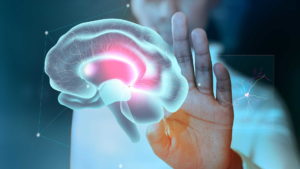
First of all, understand this; a person’s general well-being largely depends on their brain health, which is very important when considering Ischemic stroke prevention. Not only this, but even in general, brain health plays a great role. Given the significant risk that strokes represent to cognitive function and overall quality of life, it becomes vital to prioritize brain health as a basic preventive approach.
We can Sustain Brain Health at its Best, beginning with Nutritious Diet, Exercise, Enough Sleep, Mental Stimulation, and Stress management.
Anyone can begin the proactive route of stroke prevention today, regardless of age or family history. It is important to recognize and manage controllable risk factors even while certain factors, including age and genetic susceptibility, are beyond our control.
Reduce Blood Pressure: Blood pressure control is critical since high blood pressure doubles or quadruples the risk of stroke. Vascular health greatly benefits from increased blood pressure monitoring and treatment.
- Objective: Keep your blood pressure under 120/80, or as prescribed by your physician.
- How: Eat less salt, stay away from meals high in cholesterol, eat more fruits, vegetables, seafood, and whole grains, and exercise frequently. Give up smoking and, if necessary, take the recommended blood pressure medicine.
Reduce Your Weight: The risk of stroke is increased by obesity and its byproducts, such as diabetes and high blood pressure. Reducing this risk can be significantly impacted by even small weight loss.
- Goal: Create a sensible weight-loss plan in collaboration with your physician.
- How: Create a customized weight loss strategy by limiting daily caloric consumption, increasing physical activity, and working with medical professionals.
Engage in More Exercise: Exercise lowers the risk of Ischemic stroke on its own and contributes to weight loss and blood pressure control.
- Objective: Perform moderate-to-intense physical activity five days a week or more.
- How: Include regular exercises like tennis, golf, or walking. Try to engage in activities that allow you to speak while experiencing minor dyspnea.
Handle Diabetes: Blood arteries are damaged by high blood sugar, which raises the risk of Blood clots in the brain.
- Objective: Control blood sugar levels.
- How: Check your blood sugar, exercise, eat a diet as recommended, and take your medications as advised.
Give Up Smoking: Giving up smoking is a highly effective stroke-preventive strategy since it causes arterial plaque accumulation and speeds up the production of clots.
- Objective: Give up smoking.
- How: Consult your physician, make use of tools to help you stop smoking, and persevere through several tries if required.
Ischemic stroke, Blood clot in the brain, stroke symptoms in a woman, brain ischemic disease, Mini-stroke
What Happens in The Brain When Someone Has A Stroke?

A stroke results in either blocked or ruptured arteries due to a disruption in the blood supply to the brain. When a clot blocks a blood vessel, it reduces or completely stops the flow of oxygen and nutrients to a particular area of the brain, resulting in an ischemic stroke. Brain cells suffer harm or even die as a result of this deficiency of vital nutrients.
On the other hand, in a hemorrhagic stroke caused by an arterial rupture, blood seeps into the brain, causing pressure and harm to surrounding tissues. Both scenarios include the risk of irreparable brain cell damage, which could lead to permanent disability, cognitive decline, or, in extreme circumstances, death.
Symptoms Of Ischemic Stroke
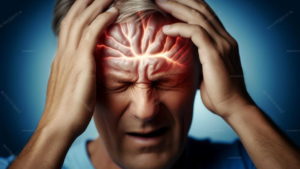
For timely medical intervention, it is essential to recognize the signs and symptoms of an ischemic stroke.
A stroke can cause a variety of symptoms but frequently involves abrupt and obvious changes. Typical warning indicators include:
- The face, arm, or leg may experience sudden numbness or weakness, particularly on one side of the body.
- Confusion or Difficulty Speaking: A stroke victim may have trouble understanding or speaking.
- Dizziness or trouble walking: Abrupt problems with balance or coordination, as well as a spinning or dizzy feeling, can also be signs.
- Suddenly blurry or darkened vision in one or both eyes and double vision are possible symptoms of problems seeing in one or both eyes.
- Headache: An abrupt, intense headache that may be accompanied by nausea, vertigo, or a change in awareness may be a sign of a stroke.
Causes of Ischemic stroke
The main cause of ischemic strokes is occlusion or blockage of a brain blood artery. The following are the most frequent causes of this obstruction: The main cause of ischemic strokes is occlusion or blockage of a cerebral blood artery.
- Atherosclerosis: Over time, the accumulation of fatty deposits (plaque) on the inside walls of arteries can constrict or obstruct blood vessels, raising the possibility that a clot will form.
- Blood Clots: Clots can develop within the brain’s blood vessels (thrombus) or they can embolize, or move from other regions of the body to the brain, obstructing blood flow.
- Cardiovascular Conditions: Disorders include atrial fibrillation, irregular heart valves, and other heart illnesses that can cause blood clots that can cause ischemic strokes.
- High Blood Pressure: Unchecked hypertension raises the risk of clot formation and damages blood vessels.
- Diabetes: Diabetes raises the risk of ischemic strokes by increasing the risk of atherosclerosis and vascular problems.
- Smoking: Using tobacco can lead to blood vessel damage and encourage the development of clots.
- High cholesterol: Atherosclerosis, a condition that narrows blood arteries, can be brought on by elevated cholesterol levels.
Ischemic stroke or any type of stroke is extremely detrimental and it is important to be aware of what can possibly happen to you.


